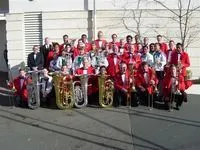Bold As Brass

In a unique collaboration, Howick Little Theatre and Howick Brass are joining forces to present King and Country, a powerfully evocative play about New Zealanders during World War I.
In a unique collaboration, Howick Little Theatre and Howick Brass are joining forces to present King and Country, a powerfully evocative play about New Zealanders during World War I. The play, which will open on Anzac Day 2009 and run for three weeks, was written by New Zealander Dave Armstrong, whose writing credits include the award-winning Niu Sila, The Tutor and Spin Doctors. King and Country has played at 10 festivals throughout New Zealand and had great reviews; the radio adaptation was highly commended in the 2007 Media Peace Awards.Based on personal accounts gathered from letters, poems and newspaper articles from the period, this heartfelt drama tells the stories of ordinary New Zealanders who enlist and travel overseas, including a war correspondent, a nurse and two members of the Pioneer Maori Battalion. Entrenched in the horror, humour and heartbreak of war, their stories are vividly brought to life with treasured New Zealand war songs, and there are six great roles available for anyone who wants to audition on February 15.
"One of the exciting things about this play is that it will be accompanied by a live brass band, and we're delighted that Howick Brass, which has been part of the eastern suburbs since 1960, has agreed to join with us to present this important New Zealand work," says the theatre's artistic adviser, Alison Mudford. "The presence of the band will add extra poignancy to the play, as they will be playing songs of the period and some of hymns that were used at funerals during that time. To have the band playing live is going to bring tears to many people's eyes, and I'm sure this moving and yet entertaining story will stay in people's hearts and minds long after they have left the theatre."
So, it's August 1914: Europe is at war and New Zealand steps into the fray alongside the Mother Country. Many young Kiwis are eager to prove themselves in battle and see the world at the same time. By 1918, our tiny country with a population of just over one million had sent over 103,000 men (including 2688 Maori troops) to serve overseas. Of that number, 16,700 were killed and over 40,000 were wounded. Few families were spared loss and grief. From their initial training in Trentham and Avondale, to the horror of the trench warfare in Gallipoli and the hopelessness of fighting in the treacherous mud at Passchendaele, the play cleverly weaves together the humour, gallantry, romance and tragedy that marked one of the crucial periods in New Zealand's development as a nation.
18/12/08